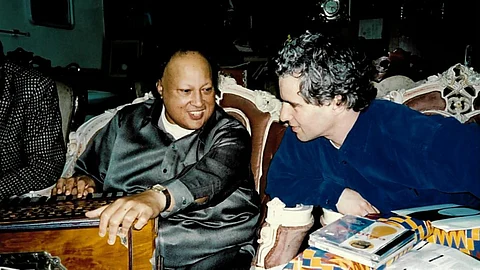Night Song: The Magic Of Nusrat Fateh Ali Khan & Michael Brook's Grammy-Nominated Album
"Qawwali is enlightenment itself."
— Nusrat Fateh Ali Khan
The 1990s was a transformative decade for world music. As technological advances in broadcast, storage, and distribution media like vinyl records, cassette tapes, and CDs became more widely available and affordable, music enthusiasts and musicians across the world were influenced by diverse musical and cultural traditions from the far ends of the world. Western musicians looked to the East for inspiration, and Eastern musicians looked to the West for innovation.
At the cutting edge of this world music movement was an unlikely partnership: that of Canadian musician Michael Brook, and Pakistani sufi singer-songwriter Nusrat Fateh Ali Khan, also known as the 'Shahenshah-e-Qawwali', or the 'King of Kings of Qawwali'. Their cross-cultural collaborations — 1990’s 'Mustt Mustt' and 1996’s Grammy-nominated 'Night Song' — not only redefined the limits of world music but also introduced Sufi music to a new generation of Western audiences, cementing Khan’s legacy as a global phenomenon.
Khan was a generational talent from a long lineage of qawwals, or qawwali performers, spanning six centuries of Sufi music tradition. In the 1980s, he had made a name for himself performing qawwali — or traditional Sufi music originally sung in the dargahs of India, Pakistan, and Bangladesh — in UK, France, Japan, and USA. Between 1985 and 1989, he performed in front of international audiences at the World of Music, Arts, and Dance festival in London; at the 5th Asian Traditional Performing Art Festival in Japan; and the Brooklyn Academy of Music in New York. In 1989, he had also collaborated with Peter Gabriel on the soundtrack to Martin Scorsese's 1988 religious epic 'The Last Temptation of Christ'. The collaboration led to Khan being signed by Gabriel's label Real World Records.
These international tours, performances, and collaborations introduced Khan to a new generation of Western musicians like Jeff Buckley, Nigel Kennedy, Michael Brook, and Eddie Vedder.
In a 2021 interview to CBC on the 25th anniversary of their 1996 Grammy-nominated album 'Night Song', Michael Brook recalled:
"Peter Gabriel, who was in charge of Real World Records, had heard my solo album that had some Asian influences in it, but was still kind of a modern, studio-type recording. So he thought I might be an appropriate producer and collaborator for Nusrat [Fateh Ali Khan], and he asked me to get involved and we recorded it in his [Real World Records] studio in Bath, England."
For Brook, the collaboration was both artistic and educational. “It exposed two cultures a little bit to each other,” he said in the interview, acknowledging how the fusion of Western and Asian music resonated deeply with South Asian listeners from India and Pakistan while introducing Western audiences to the devotional and spiritual world of qawwali music. Deeply innovative and experimental for its time, the album was nominated for the Grammy Award for Best World Music Album in 1996. Although it ultimately lost to The Chieftains' 'Santiago', 'Night Music' remains one of the most influential albums of all time. The Los Angeles View said that "this collaboration demonstrates a distinct stroke of genius, a most intoxicating spiritually uplifting cross-cultural expression", and Billboard called it “an album for the ages, solidifying Khan’s stature as one of the world’s pre-eminent singers.”
Sadly, 'Night Song' became Khan's last studio album as the legendary qawwal passed away from a sudden cardiac arrest on August 16, 1997. He was only 48 years old at the time.
Watch 'Chain of Light' — a short film about the making of the 2024 album of the same name from unreleased 1990 recordings by Nusrat Fateh Ali Khan and Michael Brook — here:
Listen to 'Night Song', Nusrat Fateh Ali Khan and Michael Brook's 1996 Grammy-nominated album, here:
If you enjoyed reading this, here's more from Homegrown:
A Match Made In Heaven: When Jeff Buckley Interviewed Nusrat Fateh Ali Khan
Celebrating The Life & Legacy Of Ustad Rashid Khan: A Hindustani Classical Legend


